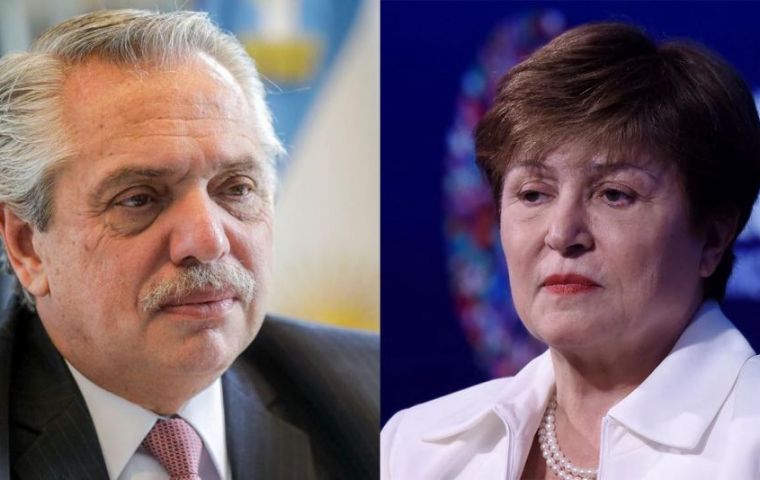
BUENOS AIRES, March 24 (NNN-MERCOPRESS) — Argentine President Alberto Fernández held a virtual meeting with International Monetary Fund (IMF) Managing Director Kristalina Georgieva, during which he ratified his Government’s commitment to the new program agreed upon.
The deal will be put up for the approval of the IMF’s board of directors Friday. Without a favorable vote, the agreement would not become effective. Both Houses of Argentina’s Parliament have already greenlighted the draft penned by Economy Minister Martín Guzmán’s team and the IMF’s managerial staff.
Fernández and Georgieva had a “constructive” conversation in which both “reaffirmed the importance” of the new extended facilities program that will allow Argentina to refinance debts for about US$ 45 billion.
However, the IMF deal did leave scars on Fernández’s administration because Vice President Cristina Fernández de Kirchner (CFK), her son, Deputy Máximo Kirchner and several lawmakers voted against it. After that, President Fernández is said to be running solo or even with the support of part of the opposition, as rejection to the Government mounts amid growing inflation and structural problems. CFK has expressed the agreement would entail a strong economic adjustment.
Nevertheless, in his conversation with Georgieva, Fernández said the program had received “broad parliamentary support.”
“The agreement will allow a responsible and passable path for our country with greater predictability, certainties and vision of the future, in an international context that presents profound challenges due to the war scenario. And it reaffirms Argentina’s absolute commitment not to postpone its economic growth with social justice,” a Casa Rosada statement quoted Fernández as telling Georgieva
The new program provides for total disbursements of about $45 billion so that Argentina can meet the heavy maturities with the agency itself between this year and 2024 arising from the “stand by” agreement signed in 2018 under then-President Mauricio Macri (2015-2019).
Among its main objectives, the new program seeks to attack Argentina’s persistently high inflation (50.9% in 2021) through a multi-pronged strategy involving a reduction in monetary financing of the fiscal deficit and a new monetary policy with positive real interest rates to support financing to the Treasury.
The plan also establishes a gradual reduction of the primary fiscal deficit from 3% of the gross domestic product (GDP) in 2021, to 2.5% this year, 1.9% in 2023, and 0.9% in 2024, which will force Argentina to cut down on energy subsidies and increase tax collection, among other measures.
Fernández “also indicated that the agreement contemplates a strengthening of public investment in infrastructure, science and technology as well as policies of social inclusion and transition from social plans to genuine employment, among others,” Casa Rosada went on. — NNN-MERCOPRESS





